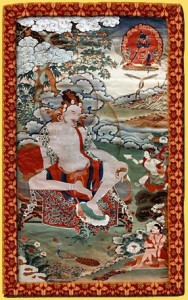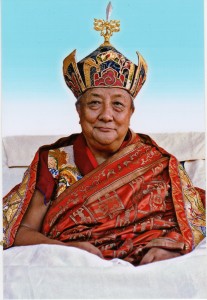The following is an excerpt from a teaching by Jetsunma Ahkon Lhamo called “Love Now, Dzogchen Later”
You should read stories about lamas in the past, stories of the saints, where lamas in the past have gone into retreat or gone to their teachers and said, “I really want to accomplish Dharma. I’m ready. I want to accomplish Dharma right now. So what will I do?” And the lama would say, “Take some retreat. Go into the cave and practice a certain mantra.” And time and time again students would go to the caves and would practice mantra. And they would come back out and they would say to the lama, “I’ve practiced this mantra and yet I don’t seem to have any result.” “Well,” lama says, “then you need three million more. Go back into the cave and practice some more.” And then again more advice. “Well I’ve not been able to practice any Dharma. Not given rise to realization although I’ve said mantra repeatedly.” Then the lama would give some other advice. “Well, go back and accomplish the bodhicitta. Accomplish the motivation.”
There are just uncountable stories like that of these great saints who struggled like you do, like we do, to accomplish their practice. And they didn’t go and get promoted every year. They had to accomplish the underpinnings, the basics, before they could move on to the next level. And it’s according to the lama’s wisdom. The lama would be able to see whether that accomplishment had really happened. And there are also many stories of disciples who would come to the lama after practicing in a cave some time or practicing in some kind of retreat, and they would say to the lama, “I have accomplished this.” And the lama would say, “See ya. Keep trying. Go back. Another three years for you.” Because that’s not what you say to your lama.
So, uncountable stories, uncountable stories that seem completely ridiculous and irrelevant in this time because of the experience that we’re having. But I’m telling you that they are not irrelevant. It’s something for each of us to take personal responsibility to study. And I really think that some of the elder monks and nuns should take on the responsibility of studying the lives of these saints and then reporting on them to other students. Maybe we could take turns giving some classes on that.
But just to go every summer and say, “I have Dzogchen. I must be okay to die now.” Or something like that, you know? Thinking that, you know, somehow magical thinking. You’ve got the bumpa on the head and you’re just set to go. I’m afraid not. I wish that it were so. There is no bumpa on this planet that is hard enough. I mean how many times has His Holiness said that without giving rise to Guru Yoga, to true devotion, you know, egoless devotion, the lama could literally bang you on the head with the bumpa until it was dented and you are too, and there wouldn’t be much value. Even though the lama had practiced. Even though it had been an unbroken chain all the way down to the original source of the teaching. Because in our practice there is a call and response. The lama gives the blessing; the student is invited to respond accordingly. It’s in the call and response connection that the growth occurs. It isn’t really what the guy above you tells you to do that makes you grow.
Our concern should always be loving concern for the welfare of sentient beings. If we are so puffed up with our own view of ourselves that we cannot bother ourselves to be of benefit to sentient beings; we cannot rouse ourselves to do something that will bring benefit to all sentient beings; we cannot bring ourselves to study on the suffering of humans, of animals—these being the two that we can mainly see on this planet— and to bring some relief, let alone worry about sentient beings in other realms that we cannot see and know are suffering,… We can’t even be bothered to look at human beings and animals. But we are going to sit there and do secret teachings, and look at others and wonder why they can’t do the same. Not appropriate. Not appropriate at all, and no benefit. No benefit.
Copyright © Jetsunma Ahkon Norbu Lhamo All rights reserved

